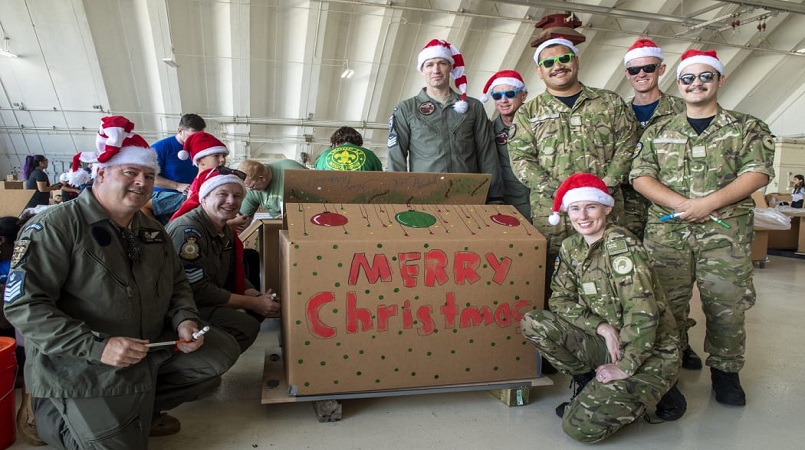
As well as essential items, the boxes include famous bars of chocolate as a treat to people living on remote Pacific Islands.
This year marks the 71st mission of Operation Christmas Drop, aiming to deliver 200 boxes in the Federated States of Micronesia, the Northern Marianas and Palau.
It began in December 1952. An American B-29 Superfortress aircraft was flying over the Northern Pacific on route to Guam when the aircrew onboard saw villagers on the small atoll of Kapingamarangi, waving at them. Moved by the Christmas spirit, the crew air dropped some of the supplies they were carrying.
"A weather recruitment Reconnaissance Squadron was looking out the window and they saw some kids in an island, and so they dropped a small toy out the back," said US Airforce Captain and Hercules Aircraft pilot Jenn Brenton.
"That was technically the start of Operation Christmas Drop as we know it today, and we have done it every year since. So now it has turned into a big humanitarian aid programme that we do every year," Capt. Brenton added.
According to the US Airforce, Operation Christmas Drop is the longest running humanitarian airlift in the world. This year marks the 71st mission, aiming to deliver 200 boxes filled with humanitarian goods and Christmas gifts to 20,000 people across 57 islands in the Federated States of Micronesia, the Northern Marianas and Palau.
The US-led multinational mission operates out of Andersen Air Force Base in Guam and includes the participation of six countries - the others being New Zealand, Australia, India, South Korea, and Japan.
"It's an honour and a privilege to be able to be a part of such a giving operation with so many nations, the atmosphere up here it's very Christmassy," said Flight Lieutenant Michal-Louise Paget of the Royal New Zealand Airforce.
"It's mainly humanitarian aid with school supplies, food, fishing equipment, blankets, tools, and toiletries. On the Christmas side of things, we topped it up with kids' toys and us Kiwis put in a few boxes of New Zealand chocolate.
"After you've dropped the bundles, you can see the people coming out to collect them and you just know that you've reached people that are so isolated and don't get the everyday supplies that we can just go down to the supermarket and get in New Zealand.
"The feeling that you are just able to help these people with what we wouldn't even regard as anything major. It is extremely special and truly embodies the Christmas spirit," she said.
For the recipients of the bundles, it's equally meaningful. The islands are under-developed, remote and small, with some having a land area of no more than a few kilometres.
"These islands don't receive many visitors and when a ship arrives there, it's usually just supplies or government services," said Richard Clark, Press Secretary for the Government of the Federated States of Micronesia.
"Operation Christmas drop is something that our remote communities always look forward to with anticipation. When you're able to see the airplane come and drop the gifts. It's an event that brings the whole of the community together and it really emphasises the spirit of Christmas, that spirit of being together," added Clark.
The last sortie of the mission takes place on December 10, at which Operation Christmas Drop would have delivered more than 30 tons of goods, parachuted in crates close to the ground.
It takes hours for sorties to reach many of the islands, and with many of the atolls being small thin strips of land, the air drop requires special manoeuvring.
"So, we use a special technique that it is uniquely suited to this type of drop. It's one of the different types of air drops that we have, and it's called low cost, low altitude. We use old shoots and cardboard boxes that are light, and then we fly very low to the ground," said Capt. Jenn Brenton.
"After we perform a drop on a point of contact, that is when you see the islanders come out of the trees or on their boats to recover the bundle. It is the most incredible moment when you see them. They are so excited. They're waving, the little kids are jumping around, and it's truly one of the most spectacular feelings I've ever had in my life. It is moving to every single person on that crew."
The air-dropped goods are donated by private donors and charities, and supplies are determined by consultations with chiefs prior to the operation.
"Is there any better example of peace and cooperation to coordinate multiple governments with multiple armed forces for the explicit and singular purpose of making Christmas absolutely amazing?" said Richard Clark.
"Or is there any better example of love and our common humanity, then to appreciate that at its core, operation, Christmas drop began its life as a nice thing to do - and it's continued on to that same premise for more than 70 years."
